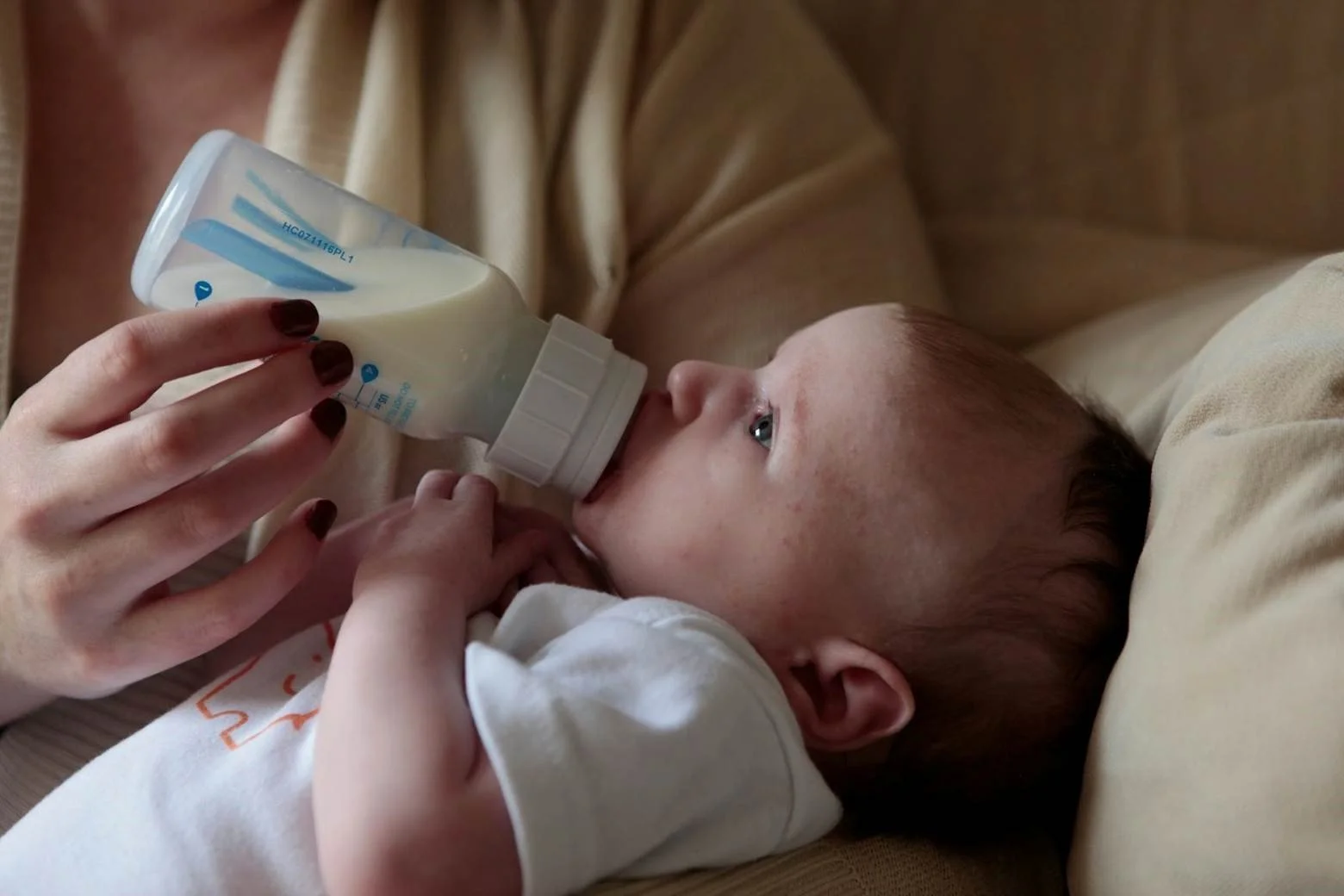Why Baby Feeding Plans Often Change Over Time
Feeding a baby is one of the most common yet deeply personal parts of parenting. Many new parents expect it to come naturally, but the reality can differ. Today, people often grow up with little real exposure to how babies are fed.
In past generations, families lived close and saw feeding as part of daily life. It's often private, leaving many parents figuring it out for the first time with their child. That can lead to confusion, stress, and even guilt when a feeding doesn't go as planned.
Dominique Deslauriers is a registered dietitian and the founder of Happy Valley Nutrition. She works with people of all ages, including children, and focuses strongly on postpartum care.
Her approach is flexible, supportive, and based on intuitive eating. She is also a mother who has faced the real-life challenges of baby feeding.
She returned to work just two months after giving birth, managed solo parenting, and made the shift from breastfeeding to formula. Dominique also lives with epilepsy, which added more layers to her postpartum journey. Her story offers both professional insight and personal experience.
In this article, you'll learn what baby feeding looked like for Dominique, from early expectations to real-life changes. You'll also see how support, flexibility, and self-care can shape a healthy feeding journey.
What Was Dominique's Exposure to Baby Feeding Like Growing Up?
Dominique saw both breastfeeding and bottle-feeding while growing up. She didn't see one as better than the other. In her family, both were simply ways to care for a baby. Her sister-in-law breastfed openly, and that felt normal to her.
She also never thought twice about a baby being bottle-fed. Dominique herself was breastfed until around nine months, then switched to formula. Her mom believes the change happened after a short trip when Dominique refused to nurse again.
Image Credits: Photo by Lucy Wolski on Unsplash
Cultural Influence on Baby Feeding
Food meant more than just eating in Dominique's home. It was a way to show love. Her grandmother used food to care for her father.
Her mother, who grew up with less, also used food as a form of love. This shaped how Dominique saw feeding. It felt warm and full of care.
Early Childhood Memories of Feeding Practices
Dominique didn't think deeply about how babies were fed. She just saw both and thought they were fine:
She saw both breastfeeding and bottle-feeding in her extended family.
Her sister-in-law breastfed openly.
She accepted both feeding styles without question.
She was fed both breast milk and formula.
She stopped nursing around nine months.
A Lack of Early Exposure to Breastfeeding
Dominique pointed out that many people don't see breastfeeding up close until they have their own baby.
Historically, families lived closer and saw others feed their babies often. Now, people live apart and treat breastfeeding as private, so early exposure is rare.
As a child, Dominique loved dolls. She had toy bottles with pretend milk and juice. That simple play helped her learn how babies are fed. These early memories still stay with her.
What Should You Know About Planning and Starting Baby Feeding?
It helps to set a goal for feeding but stay flexible. A one-year goal for breastfeeding works for many parents. Breast milk has clear health benefits, but every family's path looks different. Plans may change, and that's okay.
Image Credits: : Photo by RDNE Stock project on Pexels
How Much Preparation Is Enough?
You don't need to read every book or take a class.
A single visit to a lactation consultant can offer useful support.
Having help available matters more than using it often.
What Happens Right After Birth?
Babies often latch on their own if things go smoothly. Feeding can feel natural, even in the early hours. Some mild discomfort is normal, but sharp pain isn't always part of it.
A quiet, relaxed setting can make the start feel easier. You may go home just a few hours after birth if all is well.
How to Handle the First Days at Home
Watch for early hunger signs and feed as needed.
Find feeding positions that feel good for you and your baby.
Use a simple setup, like a zip-down bedside bassinet, for night feeds.
Expect to wake often, but you might fall back asleep quickly.
Why Less Interference Can Help
Too many outside checks can raise stress. Constant questions may lead to second-guessing. A calm space gives you time to focus and learn. When you feel trusted, it's easier to trust yourself.
What Early Challenges Might Come Up?
You may not face big problems in the first weeks. Feeding, sleep, and weight gain can all go smoothly. If any issue comes up later, support is still available. Start simple, trust your instincts, and adjust as you go.
What Challenges Can Change the Baby Feeding Journey?
Feeding plans often shift when life becomes harder. Even a smooth start can change under stress. Outside pressure, lack of support, or changes at home can lower milk supply and impact feeding choices.
Image Credits: Photo by Sarah Chai on Pexels
What Can Make Feeding More Difficult?
Solo parenting increases stress. Caring for a baby alone means less rest and more tasks. That can wear you down quickly.
Less sleep affects milk supply. Not getting enough rest can lower how much milk your body makes.
Working while feeding adds pressure. Even part-time work becomes hard when you're also handling baby care.
Pumping may not meet your baby's needs. It's tough to keep up with feeding needs while away from your baby.
At five months, these changes built up. The feeding routine fell behind. The baby's growth dipped, and it became clear that combo feeding was needed.
How Combo Feeding Can Feel at First
Starting a formula can feel heavy. You may know being fed is best, but you still feel guilt or pressure. It's common to feel like you should give only breast milk.
But meeting your baby's needs in any way is enough. What matters most is that your baby is fed, growing, and loved.
Why Mental Health Support Matters
Therapy can help process feelings and give needed space to adjust. Talking to someone who understands parenting and mental health makes a big difference. Preparing early by finding a therapist before birth helps during hard times later.
When Health Adds More Stress
Medical conditions like epilepsy make sleep more important. Poor rest can increase the risk of seizures. You may also need help with tasks like driving.
Getting enough sleep becomes part of staying safe. Feeding, rest, and health all work together to support both you and your baby.
What Can Feeding Look Like During Big Life Transitions?
Feeding your baby often shifts with life. Transitions like solo parenting, returning to work, or stopping breastfeeding can change your plan. These changes are common and okay to move through.
Image Credits: Photo by Anna Shvets on Pexels
How Sleep and Stress Affect Feeding
Sleep changes often occur when babies move from the bassinet to their crib. Night waking adds to the disruption. Missing deep sleep for days lowers energy and affects overall health.
Around this time, many parents begin combo feeding. Some choose formula when pumping isn't enough or when tiredness sets in. Others reach for it in public when breastfeeding feels harder to manage. These small changes can lead to more formula and a drop in supply.
Even with pumping, high stress and poor eating habits reduce milk output. It's frustrating to see supply drop despite trying. Still, choosing formula can help meet your baby's needs and ease your daily routine.
How Formula Feeding Changes Things
You still:
Feed your baby on cue.
Cuddle, hold and comfort them.
Stay connected through daily care.
Feeding looks different, but your bond stays strong.
Finding Peace with the Shift
Feeding doesn't always feel joyful, and that's normal. Some parents feel more fulfilled than happy during breastfeeding. That feeling is still meaningful and valid.
Capturing the last feeding in a video or photo can help close that chapter. You may not follow your first plan, but that doesn't detract from what you gave.
What matters most is that your baby feels safe, fed, and loved. No matter the method, you are doing enough. Feeding is just one part of the bigger picture of care.
Conclusion
Feeding a baby can look different for every parent. Some start with breastfeeding, some use formula, and many do both. What matters most is meeting your baby's needs in a way that works for you.
Plans can change, and that's okay. Life, stress, and health can all affect how feeding goes. Feeling pressure or guilt is common when things don't go as planned. But feeding your baby is only one part of caring for them.
Holding, calming, and responding to their needs matter just as much. You still build a strong bond, no matter how you feed. Support helps during tough moments. A calm space, helpful advice, and caring people can make things feel easier.
Mental health care is also important. Talking to someone can help you process emotions and feel more confident. Baby feeding is not about doing it all perfectly.
It's about doing what feels right, even if that looks different over time. Whether you breastfeed, bottle-feed, or combine both, you still give your baby love, comfort, and care. That is what truly counts.
FAQs
When should I introduce a baby to solid foods during baby feeding?
Most babies are ready for solids around six months. Look for signs like sitting up with support and showing interest in food.
How often should I feed my baby in the first few months of baby feeding?
Newborns usually feed every 2 to 3 hours. As they grow, they may go longer between feeds.
Can I mix breast milk and formula in one bottle during baby feeding?
Yes, you can. Just prepare the formula first, then add breast milk. Use it right away, and don't save leftovers.
What position is best for baby feeding?
There's no single best position. Use one that feels comfortable and keeps your baby close and supported.
Should I wake my baby to feed during baby feeding?
In the early weeks, yes. Babies need to eat often to gain weight. Ask your doctor when to stop waking.




